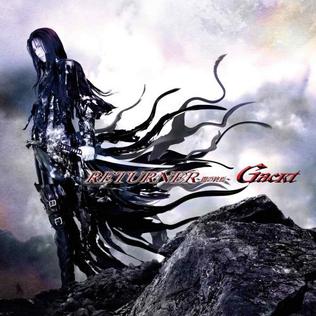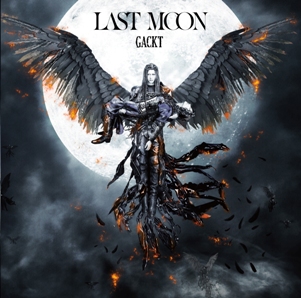
Gakuto Oshiro, better known by his mononymous stage name Gackt, is a Japanese singer-songwriter, musician, record producer and actor.
Rikako Kakiuchi, professionally known by her stage name, Rina Aiuchi and formerly known as R, is a Japanese singer, songwriter, businesswoman, fashion model, and YouTuber. Born in Higashiōsaka, Japan, she won the first season of the audition Super Starlight Contest, winning a recording contract with Giza Studio. Her eurobeat-sounding debut album, Be Happy (2001) was certified gold in Japan and spawned a top-five single, "Koi wa Thrill, Shock, Suspense", which served as the theme song to the Japanese anime television series Case Closed. Aiuchi's second album Power of Words became her best-selling album, selling over 419,000 copies nationwide and certificated platinum in Japan.

Mars is the first full-length studio album released by Japanese solo artist Gackt. It was released on April 26, 2000.

"Mizérable" is the debut extended-play or mini album of Japanese singer-songwriter Gackt, released on May 12, 1999, by Nippon Crown. It marked his solo debut, four months after he left Malice Mizer, immediately gaining success reaching second position on the Oricon Albums Chart.

The Sixth Day: Single Collection is a compilation album released by Gackt on February 25, 2004. The album collects the artist's previous single's title songs from 1999 up to 2003, some of them having been re-recorded for this release. The Sixth Day complements The Seventh Night, an unplugged album released three months later.

The Seventh Night: Unplugged is a compilation album released by Gackt on May 26, 2004. It contains acoustic arrangements of previously released songs and complements The Sixth Day, a single collection released three months earlier. The unplugged theme of The Seventh Night would be continued by Gackt's subsequent album, Love Letter.

Moon is the third full-length studio album released by Japanese solo artist Gackt on June 19, 2002. Instead of a booklet, the concept album comes with a printed note by the artist, asking readers to "sense" the record's story, rather than analyzing the lyrics. The booklet was eventually included in the packaging of Moon's 2003 follow-up Crescent. Both albums are linked, as well as his more recent albums Diabolos and Last Moon from the "Moon Saga".

Crescent is the fourth full-length studio album released by Japanese solo artist Gackt on December 3, 2003. It is a concept album linked to its predecessor Moon and comes with booklets for both records. Crescent also features a duet with L'Arc-en-Ciel vocalist Hyde for "Orenji no Taiyou" with whom Gackt co-starred in the 2003 movie Moon Child.

Love Letter is the fifth full-length studio album originally released by Japanese solo artist Gackt on February 14, 2005 in Japan.

"Redemption" is a single released by Japanese musician Gackt on January 25, 2006. Its songs "Redemption" and "Longing" were theme songs of the video game Dirge of Cerberus: Final Fantasy VII.

The discography of Japanese recording artist Gackt consists of eight studio albums, eight compilation albums, one extended play, and forty-eight singles. In 1999 Gackt signed a recording contract with Nippon Crown. His breakthrough success was the EP Mizérable, which peaked at number 2 on the Oricon albums chart. His single "Returner ", released on June 20, 2007, was his first and only single to reach the number one spot on the Oricon charts to date. In 2007, his entire back catalogue, with live song recordings from Drug Party tour, was released on the iTunes Store, video collection "The Greatest Filmography" was released in the United States and Canada, and his album Diabolos was released in 18 European countries. From November 2008 until March 2010 his records were released under his own independent label Dears, but still supported by Nippon Crown. In April 2010, Gackt transferred to Avex Group. Since February 2014 they're released by his independent record label G&Lovers, which is supported by Crown Tokuma. As a solo artist, since 2009 are reported sales of over 10 million, and holds the male soloist record for most top ten consecutive chart singles as of July 18, 2011.

"Metamorphoze" is a single released by Gackt on May 25, 2005 under Nippon Crown.

"Returner " is a single released by Gackt, on June 20, 2007, by Nippon Crown. It is Gackt's first single to top the Oricon Singles Chart, and first by record label since Kaze's "22-Sai no Wakare" released in 1975.
Ju-ken is a Japanese session bassist. He was a support member of Gackt, The Wanderers and Anna Tsuchiya. He is one of the most in-demand bassists in Japan.

"Todokanai Ai to Shitteita no ni Osaekirezu ni Aishitsuzuketa..." is a single released by Gackt on August 10, 2005 under Nippon Crown.

0079–0088 is a compilation album released by Gackt on December 19, 2007. It contains eight tracks, which had either previously been used on the soundtracks of the Mobile Suit Zeta Gundam movies or were covers of earlier songs from the Gundam franchise.

"Kimi ni Aitakute" (君に逢いたくて) is a single released by Gackt on October 27, 2004 under Nippon Crown. It peaked at second place on the Oricon Singles Chart and charted for seventeen weeks. In 2004, it was the 96th best selling single of the year, with sales of 98,335 copies. It ultimately sold 124,280 copies, making it Gackt's ninth best selling single. It was certified gold by RIAJ.

Moon Saga: Mysteries of Yoshitsune I & II is a duology of theatre stage plays written, composed and directed by Japanese recording artist Gackt. The original productions are notable for the first major use of projection mapping in theatre stage plays. The original soundtrack was released on October 1, 2014 and compiles music from the plays. It consists of two music CDs, one for each chapter, the first of which was performed in 2012, while the second was performed in 2014.

Last Moon is the eighth full-length studio album by Japanese recording artist Gackt released on April 27, 2016 in Japan. As a concept album, it is considered to be the final, but not ending part of "Moon Saga", a conceptual story by which is linked to its predecessor albums Moon (2002), Crescent (2003), and Diabolos (2005), as well as the movie Moon Child (2003), theatre play Mysteries of Yoshitsune I&II (2012–2014), and two novels.

"Ai o Sakebe" (愛を叫べ) is the 47th single by Japanese boy band Arashi. It was released on September 2, 2015 under their record label J Storm. "Ai o Sakebe" was used as the background song for the Recruit Zexy commercial. The single sold 462,550 copies in its first week and topped the weekly Oricon Singles Chart. With over 519,000 copies sold, the single was certified Double Platinum by the Recording Industry Association of Japan (RIAJ). "Ai o Sakebe" placed 12th on Oricon's 2015 yearly singles ranking.


















